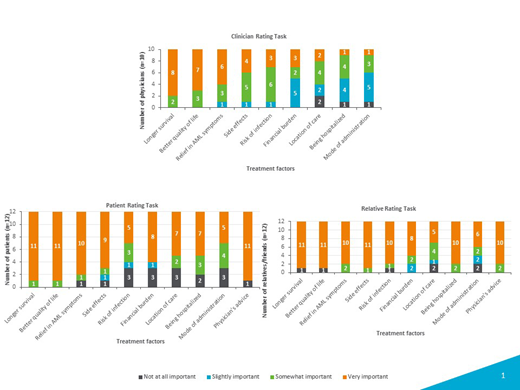INTRODUCTION: Acute myeloid leukemia (AML) is a rare hematologic cancer primarily affecting older people, with a median age at diagnosis of 67 years old (Almeida & Ramos, 2016). Heterogeneity in the presentation, functional status and presence of comorbidities among AML patients presents unique challenges for treatment. Intensive chemotherapy (IC), although the best option for prolonging survival, carries a risk of early death and other trade-offs, including significant time spent in the hospital. The toxicity of IC treatment and the requirement for prolonged hospitalizations may negatively affect patients' physical functioning and health-related quality of life (HRQoL). Novel, low-intensity treatments can be administered in the clinic and may pose less risk of immediate toxicities but may be associated with reduced efficacy. Each patient and family will approach these trade-offs differently, yet few studies examine the process of shared decision-making in AML. We aimed to better understand this process by eliciting patient/family and physician narratives about expectations and attitudes towards AML treatments.
METHODS: Ten physicians in the US (n=4), UK (n=3) and Canada (n=3) and 12 AML patients (all US) and a member of their family took part in an individual, 60-minute qualitative telephone interview. Further interviews are scheduled and any additional data at the time of presentation will also be reported. The interviews followed a semi-structured guide comprising open-ended questions. The overarching aim of the interviews was to understand the value of living longer for AML patients who are not candidates for standard IC and to explore the treatment decision process from the patient, family and physician perspective.
During the interviews, each participant (patient, family member or physician) completed a rating exercise in which they were asked to rate a list of pre-defined factors (9-10 factors) on a scale of 0 (not at all important) to 3 (very important) to determine their importance in AML treatment decisions. As well as providing a numerical rating for each factor, each participant was asked why they selected their rating and which three factors they would consider the most important.
RESULTS: Across all three groups, relief in AML symptoms (namely fatigue and pain), longer survival and better QoL were equally considered the three most important factors when making a treatment decision. All three groups described the interaction between QoL and longer survival, explaining that any increase in survival would be important, but only if QoL (time spent with family, maintaining hobbies/interests) was maintained or improved. Physician's advice was also important to AML patients when making decisions regarding treatment.
Other treatment-related factors within the rating task were rated as very important for at least a subset of patients, with no factors widely considered to be of limited importance. All participants noted that while relief of AML symptoms, longer survival and quality of life were all important, these had to be considered in light of treatment side effects and risk of infection. Likelihood of being hospitalized was important to family members, as they wanted to spend quality time at home with their loved ones, while patients and physicians considered hospitalization as an inevitable consequence of the disease and treatment.
All participants reported that AML patients would consider taking any form of treatment if suitable and effective, regardless of the mode of administration. However, it was acknowledged that oral treatments would be more convenient and less invasive. The relative importance of location of care/treatment delivery was influenced by proximity to resources and whether the participant was based in an urban or rural setting. The ability to receive treatment at home was considered beneficial.
CONCLUSIONS: The results from this rating exercise and qualitative interviews showed convergence across all stakeholders, indicating that AML patients, family and physicians have similar priorities regarding treatment decisions, prioritizing symptom relief, survival, and quality of life. The predominant treatment pathways in AML each require trade-offs in these factors, demonstrating the importance of shared decision making in ensuring the most appropriate treatment is selected for a given individual, in accordance with their values, goals, and preferences.
LeBlanc:Jazz Pharmaceuticals: Research Funding; Daiichi-Sankyo: Membership on an entity's Board of Directors or advisory committees; Otsuka: Consultancy, Membership on an entity's Board of Directors or advisory committees; Heron: Membership on an entity's Board of Directors or advisory committees; Helsinn: Consultancy; Flatiron: Consultancy; NINR/NIH: Research Funding; Duke University: Research Funding; Astra Zeneca: Consultancy, Research Funding; Amgen: Membership on an entity's Board of Directors or advisory committees; Medtronic: Membership on an entity's Board of Directors or advisory committees; Seattle Genetics: Consultancy, Research Funding; Celgene: Honoraria; AbbVie: Membership on an entity's Board of Directors or advisory committees; Pfizer Inc: Consultancy; American Cancer Society: Research Funding; Agios: Honoraria, Membership on an entity's Board of Directors or advisory committees, Speakers Bureau; CareVive: Consultancy. Walter:Seattle Genetics: Research Funding; Agios: Consultancy; Amgen: Consultancy; Amphivena Therapeutics: Consultancy, Equity Ownership; Aptevo Therapeutics: Consultancy, Research Funding; Argenx BVBA: Consultancy; Astellas: Consultancy; BioLineRx: Consultancy; BiVictriX: Consultancy; Boehringer Ingelheim: Consultancy; Boston Biomedical: Consultancy; Covagen: Consultancy; Daiichi Sankyo: Consultancy; Jazz Pharmaceuticals: Consultancy; Kite Pharma: Consultancy; New Link Genetics: Consultancy; Pfizer: Consultancy, Research Funding; Race Oncology: Consultancy. Hernandez-Aldama:Pfizer Inc: Consultancy. Sully:Pfizer Inc: Consultancy; Adelphi Values Ltd: Employment. Bell:Pfizer Inc.: Employment, Equity Ownership. Johnson:Pfizer Inc: Consultancy; Adelphi Values Ltd: Employment. Peloquin:Pfizer Inc: Employment, Equity Ownership. Gater:Pfizer Inc: Consultancy; Adelphi Values Ltd: Employment. Welch:Pfizer Inc: Employment, Equity Ownership. O'Hara:Adelphi Values Ltd: Employment; Pfizer Inc: Consultancy. Russell:Astellas: Consultancy, Honoraria, Speakers Bureau; Pfizer Inc: Consultancy, Honoraria, Speakers Bureau; Jazz: Consultancy, Honoraria, Speakers Bureau; DSI: Consultancy, Honoraria, Speakers Bureau. Horikoshi:Pfizer Inc: Consultancy. Maze:Pfizer Inc: Consultancy; Novartis: Honoraria, Membership on an entity's Board of Directors or advisory committees.
Author notes
Asterisk with author names denotes non-ASH members.


